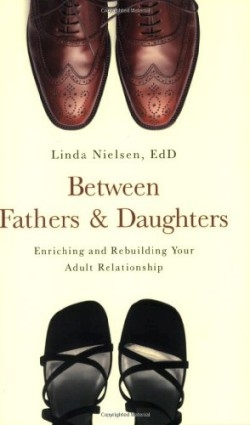It looks like you've stumbled upon a page meant to be read by our code instead of viewed directly. You're probably looking for this page.
Between Fathers & Daughters
Enriching and Rebuilding Your Adult Relationship
In recent years, the importance of fathers has come into focus, particularly regarding their relationships with sons. But the bond between father and daughter hasn’t been as fully explored, and there’s been very little discussion of what happens as the daughter approaches adulthood. By that point, both father and daughter may feel it’s not worth the effort, that old patterns are too firmly entrenched to be changed. And besides, mothers are the ones who really matter to daughters.
Not so fast, says Linda Nielsen, Ed.D. in her new book. The relationship between fathers and daughters is equally as important. When the childhood/adolescent years don’t go well the father/daughter bond can be repaired and regenerated in the adult years. Nielsen is careful to point out that she’s talking about relationships which haven’t been affected by more debilitating actions, such as addiction or physical abuse. She’s looking at the average father/daughter relationship that simply never got off the ground—thus leaving an emotional hole in both lives.
Nielsen authored three previous books about adolescents, and is a professor of Women’s Studies and Education at Wake Forest University. She has done extensive research on the topic, covering media portrayals of father/daughter relationships, gender differences in parenting, and the changing role of fathers. The book is heavily footnoted, with an extensive reference section at the end. However, it’s not an academic tome, but a friendly handbook for both fathers and daughters who have distance to cover in regaining a worthwhile relationship, even past adolescence.
Nielsen provides quizzes, checklists, conversation starters, profiles of famous daughters and fathers, and most importantly, encouragement to begin the journey, difficult though it may seem. She acknowledges that not all damaged relationships can be fixed, but that’s not an outcome that can be predicted without trying. As she says, “Ask yourself: What have I got to lose? You don’t have a relationship now—if things don’t work out, you’re probably not going to end up feeling worse than you do now.”
Reviewed by
Amy Rea
Disclosure: This article is not an endorsement, but a review. The publisher of this book provided free copies of the book to have their book reviewed by a professional reviewer. No fee was paid by the publisher for this review. Foreword Reviews only recommends books that we love. Foreword Magazine, Inc. is disclosing this in accordance with the Federal Trade Commission’s 16 CFR, Part 255.
